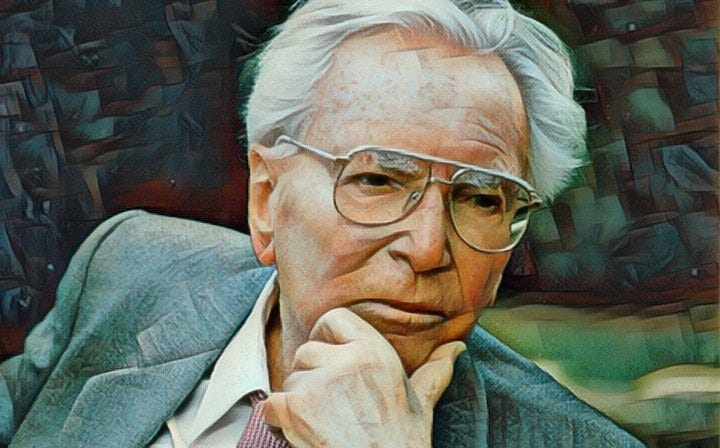Teaching Survival Through Manhood
Learning about the essence of manhood through Viktor E. Frankl's observations on survival in the midst of the Holocaust.
Man’s Search for Meaning
One of my favorite books is "Man's Search for Meaning" by Viktor E. Frankl, an Austrian neurologist, psychiatrist, and Holocaust survivor. I remember when I finished reading it for the first time, I had this strange feeling of despair and hope at the same time. Despair for the stories of those who perished—and hope for the story of survival Frankl lived to tell.
Published in 1946, the book is divided into two parts: autobiography and psychological analysis—Frankl's experiences in Nazi concentration camps and the development of his psychotherapeutic method called logotherapy.
Frankl describes his horrifying experiences in Auschwitz and other concentration camps. He focuses on the psychological reactions of the prisoners to their experiences. He observes that those who found meaning in their suffering were more likely to survive. Frankl recounts how he and other inmates found purpose in various forms, whether in thoughts of loved ones, in religious faith, a desire to witness and tell the truth about the camps, or in small acts of kindness and solidarity.
Frankl also explains logotherapy, his psychological theory. Logotherapy’s main premise is that the primary motivational force in humans is to find meaning in life. Arguing that even in the most absurd, painful, and dehumanizing situations, life has potential meaning, and therefore even suffering can be meaningful. This idea is encapsulated in Friedrich Nietzsche’s famous statement, "He who has a why to live for can bear almost any how."
Frankl's book is more than a tale of survival. It serves as a profound reflection on the enduring strength of the human spirit amidst severe adversity. It challenges us to look at our lives and search for meaning. I asked myself after, “Could I do that? Could I find meaning in the suffering? Am I man enough?”
Manhood
What is a man, and what is his purpose? Marcus Aurelius said, “A man must stand erect, not be kept erect by others.” But what about our boys? How do they become men if men abandon their sons?
When I think, “What is a man?” I think about my dad. Growing up, I wanted to be him. When I was young, I styled my hair and dressed like him. That changed as I got older. But even as we disagreed on many of life's choices, I never stopped wanting to be like him. At his core, he is a good man who works hard and treats others around him with respect.
Now, as an adult, I am lucky to have a flexible work schedule. It provides me with ample opportunity to volunteer at my kid's schools. The elementary school has this great program called “Watch D.O.G.S.,” where dads come in and spend the day with their kids in the school. I have done this a few times with both of my elementary school children. It’s a fantastic way to get to know some of the most important people in our children's lives and, at the same time, help the overwhelmed education system.
While in the school, I noticed some things. Teachers are overworked, classes are overfilled, and the curriculum is bloated. I also noticed something else. The staff is predominantly women. So, I decided to do something to help.
I love to read. It’s a passion. I went to the librarian and asked if they needed any help. I was looking to volunteer for 2-4 hours one day a week. I received an enthusiastic yes. We picked a day, and I added it to my calendar. Then I went to my kid's teachers and let them know that I would be in the school one day of the week and that if they needed any administrative work done, to leave it for me with instructions, and I would knock it out while I was there.
“The measure of a man is what he does with his power.”—Plato
My dad worked as a heavy equipment road mechanic when I was young. He wasn’t able to come to my school during the day. But sometimes, he would take me to work with him, and I would sit in the truck all day, watching him work on these massive vehicles. Sometimes, we were at airports or rock quarries, and sometimes, we were at his shop. When there weren’t airplanes to watch, I might wander out of the truck and ask him questions or maybe hold a light. He would go home exhausted and covered in grease. During the winter, he would plow snow for extra money. He would wake me up before sunset to sit in the truck, waiting for the snow to fall. During the long day, we talked about family and work and watched him pull others from the snow and clear driveways that were off his route.
Our boys are growing up in a confusing time. Not every man has the opportunity to volunteer at school. But every man can lead in one form or another. Fathers are concerned about what their children are learning at school from their friends, teachers, and libraries. There is much animosity against the education system. Social media is full of viral videos of dads unleashing their frustrations at school board meetings. Is the frustration justified? Is it an appropriate use of our power? Is that what being a man is?
Last week, when I was in the library putting books away, one of the boys from my daughter's class was there to pick out a book. He recognized me. He said, “I know you. You read Pete the Cat.” Then he asked me if I would help him pick out a book. I asked him what type of hobbies and TV shows he liked. Then, we walked over to the graphic novel section. We looked at books about superheroes and football, eventually settling on a Dog Man book.
What is the answer to that question man has asked himself for millennia? What is a man’s purpose in life? I learned from my father that a man is someone who stands erect and lifts others up. A man sees problems and acts on them. A man understands his power and uses it for others. A man leads by example because he knows boys will follow.
Frankl ends his book with this admonition:
“So, let us be alert–– alert in a twofold sense:
Since Auschwitz we know what man is capable of.
And since Hiroshima we know what is at stake.”
Men are not perfect. As men, we must forgive ourselves when we give in to our frustrations. We each face different challenges. Man is born to adapt and survive. And if man is to survive, we must understand our why and work to protect it. We can give into despair or look for hope in our sons’ eyes. When we help our boys, we help ourselves because we know what’s at stake.
Jeff Mayhugh is the co-founder of the Madisonian Republicans and a former Congressional Candidate for VA10. @Jmayhugh28




